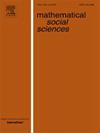具有残疾风险的最优退休模型的分析方法
IF 0.7
4区 经济学
Q4 ECONOMICS
引用次数: 0
摘要
最优退休模型应反映现实中由残疾风险引起的市场不完全性。在本文中,我们开发了一种具有残疾风险的最优退休模型的分析方法。更准确地说,我们提供了总财富的分析性特征,总财富是金融财富和未来收入现值的总和。然后,我们提供了退休财富阈值的分析性质。最后,我们导出了具有退休和残疾风险的分析最优消费和投资组合选择。本文章由计算机程序翻译,如有差异,请以英文原文为准。
Analytic approach for models of optimal retirement with disability risk
Models of optimal retirement should reflect market incompleteness in reality caused by disability risk. In this paper, we develop an analytic approach for optimal retirement models with disability risk. More precisely, we provide an analytically tractable characterization of total wealth that is the sum of financial wealth and the present value of future income. We then provide analytic properties of the retirement wealth threshold. Finally, we derive the analytical optimal consumption and portfolio choice with retirement and disability risk.
求助全文
通过发布文献求助,成功后即可免费获取论文全文。
去求助
来源期刊

Mathematical Social Sciences
数学-数学跨学科应用
CiteScore
1.30
自引率
0.00%
发文量
55
审稿时长
59 days
期刊介绍:
The international, interdisciplinary journal Mathematical Social Sciences publishes original research articles, survey papers, short notes and book reviews. The journal emphasizes the unity of mathematical modelling in economics, psychology, political sciences, sociology and other social sciences.
Topics of particular interest include the fundamental aspects of choice, information, and preferences (decision science) and of interaction (game theory and economic theory), the measurement of utility, welfare and inequality, the formal theories of justice and implementation, voting rules, cooperative games, fair division, cost allocation, bargaining, matching, social networks, and evolutionary and other dynamics models.
Papers published by the journal are mathematically rigorous but no bounds, from above or from below, limits their technical level. All mathematical techniques may be used. The articles should be self-contained and readable by social scientists trained in mathematics.
 求助内容:
求助内容: 应助结果提醒方式:
应助结果提醒方式:


